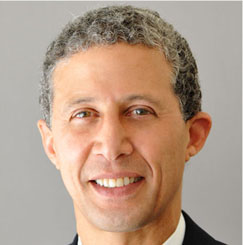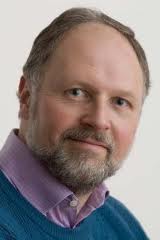Printed in the Summer 2014 issue of Quest magazine.
Citation: Boyd, Tim. "The Question of Seeing" Quest 102. 3 (Summer 2014): pg. 88-89.

Like many of us, if you were to follow me home you would find a couple of places in the house crowded with photographs. On top of the dresser in the bedroom are photos of family—my daughter, my wife’s parents, my parents, brothers, sisters. In my study I have other photos—teachers, wise women and men, special moments. It is here that you would find one of my favorite pictures. It is a photo of my daughter and me. It was taken at the end of a long day of walking and sightseeing in Washington, D.C. It was her first trip to the city. She was ten or eleven years old. We are sitting at the foot of the long stairway leading to the Lincoln Memorial. Both of us are tired—I more than she. So when the photo was taken, we were not frowning or straining to smile. I was simply looking at the camera, content to be sitting with my daughter by my side. We are seated on a granite embankment on a cool November day, with green boxwood hedges as a backdrop. My daughter is on my left, leaning her head on my shoulder, smiling and flashing a peace sign — something she tended to do in photos at that age. The photo is a freeze-frame of a contented moment, both of us happy; happy to be sitting down, happy with each other, happy because there was no reason not to be.
That photo was taken ten years ago, but when I look at it I remember the moment well. Nowadays when I take the time to study it, I see other things. One of the main things that stands out is how different we both look now. Then, unlike now, I had just a few gray hairs. My face was smooth, without the lines that I have now come to say give my face “character.†My daughter is grown and in college. Her choice of clothes has changed. Her hair is now rarely styled in that little-girl ponytail that was her constant look as a child. The peace sign no longer comes up as the chosen photo affectation. All of it has changed.
Perhaps the most remarkable thing about examining that photo is that in spite of the changes, when I look at it I recognize myself and feel that in some way I am the same person. In spite of the evidence of change, there seems to be some essential sense of “me-ness†that fuses the person in the photo and the one looking at it today into a consistent whole. This habitual way of seeing is paradoxical. On one level it is correct, but at the same time, it is fundamentally wrong.
There is a piece of popular “knowledge†that has been repeated enough to have attained the status of a recognized fact. It says that all fifty to seventy-five trillion cells that make up our bodies die and are replaced every seven to ten years. Though not entirely accurate, this statement expresses a fundamental truth about the body’s impermanence. In a physical sense we are always changing, and the facts do not support our cherished idea of a continuous sense of self.
Although the physical body is the most visible part of what we call our self, most of us are as strongly attached to other, less material dimensions of our being—our feelings and thoughts. From the Theosophical point of view, what we identify as the personality is the combination of the physical, emotional, and mental components of an individual. Like the physical body, this arrangement of materials is ever-changing and temporary—even more so than the physical. Thoughts and emotions come and go rapidly. It is useful to keep in mind that from the Theosophical perspective the stuff of emotions and thought is considered matter in the same way that we regard solid, liquid, and gas as merely more refined, less dense physical matter. In letter 10 of the original edition of The Mahatma Letters to A.P. Sinnett, the Master Koot Hoomi makes the sweeping statement, “We believe in matter alone, in matter as visible nature and matter in its invisibility.†A continual stream of thoughts and feelings enter and exit, leaving their tracks and shaping the materials of our astral and mental bodies.
The specific combination of matter that we each identify as “me†holds together for a lifetime, then dissolves into the basic units that comprise it. At the end of a life the processes of change that have been ongoing become more pronounced. In the absence of a binding force the physical body decomposes. All of its materials are reduced to molecules and atoms and are recycled into the pool of materials used to build other life forms. The same holds true for the material of the emotions and thoughts. In a very real sense, even physically, we are one with all beings. Ultimately our substance finds its way into the bodies of all creatures. Thich Nhat Hanh uses the term “interbeing†to express this radical interdependence and beautifully says, “The tears I cried yesterday have become rain today.â€
Mathematicians have applied their methods to this idea of interbeing in some fascinating ways. In one exercise the calculation was made for how many of Buddha’s atoms each of us has in our bodies. (My Buddhist friend says that these particular mathematicians are people who clearly have too much time on their hands.) There are three sources of Buddha’s atoms: (1) those produced at the time of his death, (2) those breathed out during his lifetime, and (3) those that exited in the form of solid, liquid, and gaseous waste while he was alive. Some of those atoms mixed in the atmosphere; some in the water; some in the earth, becoming present around the world in a period of days, months, or years. After some basic calculations accounting for the total number of Buddha’s atoms and the number of atoms in the total environment, it is possible to arrive at an approximation of how many of his atoms are in each of us. The startling number is two hundred billion (2 x 1011). Remarkable!
Before this little fact swells our egos, and we start rewriting the Dhammapada, or changing the Four Noble Truths to five, it would be good to realize that in terms of the total number of atoms in our bodies, this number is insignificant. The average human body has the unfathomable number of 4 x 1027 atoms — 4 followed by 27 zeroes! The Buddha contingent literally amounts to less than a grain of sand does on a beach. For the sake of humility we also should keep in mind that in addition to the atoms of Buddha, Jesus, Mother Mary, and Sitting Bull, within us are atoms of Stalin, Pol Pot, Nero, and every other good, bad, or indifferent person, animal, or plant that has ever appeared on earth.
There is a profound principle at work here. The materials that pass through the personality are changed by the contact. They are quickened or dulled by the quality of the consciousness within which they are embodied. Rather than looking at the experience of being human as some solid, permanent state of affairs, it might be more accurate to view our human experience, our period of incarnation, as a meeting place for the ever-flowing, ever-changing streams of the physical, emotional, mental, and spiritual. For the time that they are intermixed, each stream influences the other. Patanjali, in his Yoga Sutras, describes the purpose of the coming together of the streams of spirit and matter (purusha and prakriti respectively) as “the gaining by the purusha of the awareness of its true nature and the unfoldment of powers inherent in it and prakriti.†During our lives we are continually charging all of the materials we encounter with the qualities of our consciousness and passing them on to others.
To some, this idea of interbeing, which includes the illusory, impermanent nature of the self, is disturbing. By definition it is difficult to grasp. In the words of the twentieth-century Taoist writer Wei Wu Wei, “99.9% of everything you think, and of everything you do is for yourself, and there isn’t one.†For those who through careful consideration and practice eventually emerge into this way of seeing, it is liberating. Gone is the sense of needy grasping and competition. The gnawing sense of loneliness that drives so much of all the things we do, from entertainment to relationships, evaporates with the profound awareness of our inviolable connection. The meaning of service also transforms. What act of service could be more far-reaching than the careful regulation of the quality of the thoughts we think and the emotions we encourage in ourselves? This is our ongoing contribution to the stream of life that flows through us all. From moment to moment we choose the quality of our sharing. Will it be a muddied current of confused emotion and thought, or a brightened stream of blessing? It’s all in what we see.


 Today, when money and spirituality are mentioned together, something called the Law of Attraction often comes up. The idea behind it is that thought in and of itself produces results in the physical world. Moreover, "like attracts like." That is, if you're spending a lot of time brooding about financial worries, those very thoughts are going to bring problems to you. Conversely, if you think thoughts of wealth and abundance, the dollars will be banging on your door.
Today, when money and spirituality are mentioned together, something called the Law of Attraction often comes up. The idea behind it is that thought in and of itself produces results in the physical world. Moreover, "like attracts like." That is, if you're spending a lot of time brooding about financial worries, those very thoughts are going to bring problems to you. Conversely, if you think thoughts of wealth and abundance, the dollars will be banging on your door.